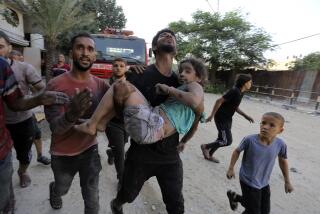Africa’s Clerics Are Urged to Help AIDS Orphans
- Share via
NAIROBI, Kenya — By 2010, the United Nations expects 20 million children in sub-Saharan Africa to be so-called AIDS orphans, their parents having succumbed to the deadly disease.
The AIDS pandemic has already left 14 million African children parentless. Many are now cared for by aging grandparents. Others, barely able to care for themselves, are heads of households, minding younger siblings. And hundreds of thousands more live on harsh African streets.
As HIV infection has laid waste to communities across Africa, however, the continent’s religious leaders have remained largely silent. But Sunday, some of Africa’s top clerics gathered in this capital to discuss how the religious community could make up for lost time and become a new voice for the legions of children devastated by AIDS.
“Through our silence and denial, we have contributed to increased stigma and exclusion of people living with HIV/AIDS and their families,” said Twaib Mukuye, a leader of Uganda’s Muslim community. Now “we are here to launch a continent-wide jihad on AIDS.”
Enlisting leaders of various religious denominations--from traditional healers to Roman Catholic priests--has become a key strategy for U.N. officials and community leaders lobbying on behalf of the 25 million people in sub-Saharan Africa living with HIV.
In an interview Sunday, UNICEF Director Carol Bellamy said religious groups are uniquely suited to address social problems involving AIDS.
Through their churches, mosques and temples, Bellamy said, leaders could disseminate information about how the disease can be treated and prevented. Many religious groups also have at their disposal networks of schools, hospitals and social service organizations that could be used to help AIDS patients and their families.
“As long as HIV/AIDS remains a shameful disease, it will not be taken on fully,” Bellamy said.
Some African clerics have campaigned for affordable AIDS drugs. Others, including Catholic priests, have challenged the Vatican’s opposition to birth control, including condoms. But for the most part, clerics have been reluctant to preach about AIDS and prevention.
“We still hear sermons from preachers who say people who are infected deserve that,” said Ludfine Opudo, who heads the Kenya chapter of the Society for Women and AIDS in Africa, an advocacy group.
“These same people can do immense good if they speak with one voice about people who lose their jobs because they have AIDS, or about children who are disinherited after their parents die, or talk about the general stigma of having AIDS in a developing country,” said Opudo, who is HIV positive and the mother of an 8-year-old girl.
In Africa, the burden of caring for AIDS orphans has fallen mostly on nongovernmental organizations, along with relatives and friends of the deceased.
During the last three years, Leonora Obara has seen her family grow to 10 children, thanks to the five AIDS orphans she has taken into her small home in the Umoja estate, about 15 miles outside Nairobi.
After her husband’s brother and his wife both died within the last eight months, Obara faced the prospect of watching two nephews and a niece join thousands of Nairobi street children who have nowhere to go.
But three years ago, Obara, a 39-year-old social worker, had already brought home two young children who became orphans when one of her clients died.
At first, her husband objected to her taking in the orphans, saying their meager annual income--a little more than $10,000--was already stretched thin. He agreed when Obara, a devout Seventh-day Adventist, pointed to scriptures extolling the virtues of caring for widows and orphans.
The decision to take in the orphans meant that the Obaras had to rent another room adjacent to their small two-bedroom apartment, which is constructed of concrete blocks. Now, eight girls, ranging in age from 2 to 12, sleep in a small kitchen that has been converted to accommodate five bunk beds. The two boys sleep in a separate room.
Her rent, grocery and education bills have increased dramatically, but Obara said she manages to survive without help from anyone.
“I don’t have a lot of money, but we have a little compassion for these children,” she said softly.
Many of the 120 clerics attending the three-day gathering here on children and HIV/AIDS will visit orphanages run by nongovernmental organizations, church groups and individuals to see how they could be replicated in their own countries.
Clerics will also be given tutorials on caring for and supporting AIDS orphans and developing national strategies to lobby on behalf of AIDS patients.
Mercy Manci, a traditional healer from Pretoria, South Africa, who is representing an association that promotes traditional African medicinal systems, said the various religious groups have to forget their theological differences and implement a coordinated plan to help AIDS orphans.
The stakes, she said, are high.
“Because society has been late in stopping the deaths of their parents, we have to work quickly to save the next generation--before it’s too late,” she said.
More to Read
Sign up for Essential California
The most important California stories and recommendations in your inbox every morning.
You may occasionally receive promotional content from the Los Angeles Times.










